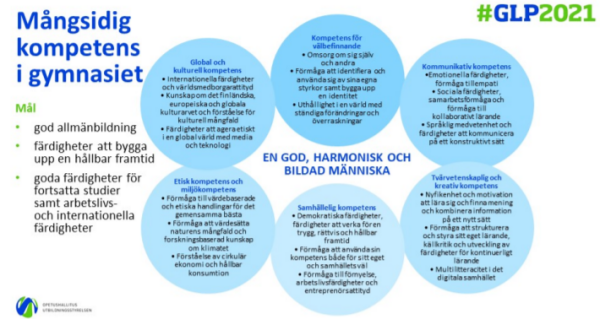 References to the Curriculum for Vörå samgymnasium-idrottsgymnasium 2021 Regarding Social Sustainability:
References to the Curriculum for Vörå samgymnasium-idrottsgymnasium 2021 Regarding Social Sustainability:
For each theme area, there are references from the curriculum for each compulsory subject where the theme can be reflected.
Here you will find references to the theme area Mental Training in the subject psychology.
There are also references to the theme area Equality in the subjects history, study guidance, and health education.
Finally, there are references to the theme area Well-being (sleep, diet, balance between school and leisure) in the subjects psychology and health education.
THEME: MENTAL TRAINING
"The mission of the psychology subject is to equip the student with the skills to observe, understand, and assess human mental activity and the social, cultural, and biological factors that influence it."
The goals related to mental training are:
- "Be able to explain the characteristics and differences between conscious and unconscious activity"
- "Be able to describe psychological, biological, social, and cultural factors related to human activity."
- "Familiarize with a phenomenon related to well-being from a psychological, biological, social, and cultural perspective."
"Education should highlight the significance of human rights, equality, and gender equality, as well as the opportunities that democracy and international cooperation offer for solving today's and future challenges."
The goals related to gender equality are:
- "Being familiar with the central processes that have shaped European societies and the global economic system."
- "Understanding the developments that have led to today's economic, social, and demographic phenomena and being able to analyze various factors that have influenced these developments."
- "Being able to analyze the development of the population, economy, and social structures and how they are dependent on the environment."
- "Having the critical ability to assess how changes in technology and information shape people's living conditions."
- Social Competence: "In history education, the importance of human rights, equality, and gender equality is emphasized."

"Study guidance connects studies with working life and promotes justice, equal treatment, gender equality, equality, and inclusion, while preventing exclusion from education and working life."
The goals related to equality are:
- "Understand the significance that the values, beliefs, and people important in one's life have for choices and decisions."
- Societal Competence: "During the study guidance, the student develops the knowledge and skills needed to be a responsible citizen who actively participates in society."
- Communicative Competence: "During the study guidance, the student develops the knowledge and skills needed to be a responsible citizen who actively participates in society."

"The core values of the subject are based on respect for life, a dignified life in accordance with human rights, gender equality, equality, responsibility, and active citizenship."
The goals related to gender equality are:
"Be able to explain how various phenomena in different health cultures arise and assess their significance for health, as well as apply important social psychological models and theories to explain different lifestyles."
- Well-being Competence: "[...] develop an understanding of the individual, social, and societal conditions for well-being and provide increased readiness to promote one's own and others' health and well-being."
- Communicative Competence: "Acquiring knowledge together with others enhances social skills and the ability to collaborate."
- Interdisciplinary and Creative Competence: "[...] reflect on the significance of the various topics addressed in health knowledge for the student themselves."
- Societal Competence: "The goals and values of the educational subject should encourage the student to, among other things, consider the conditions for a safe environment, health inequality, and the consequences of lifestyle choices."
- Ethical and Environmental Competence: "[...] students analyze their own consumption patterns and the health effects of different environments and solve ethical problems."
- Global and Cultural Competence: "In health education, one seeks explanations for the occurrence of various phenomena in different health cultures and evaluates their significance."

"The mission of the subject of psychology is to equip the student with the skills to observe, understand, and assess human psychological activity and the social, cultural, and biological factors that influence it."
The goals related to well-being are:
- "Be able to describe psychological, biological, social, and cultural factors related to human activity."
- "Familiarize oneself with a phenomenon related to well-being from a psychological, biological, social, and cultural perspective."
- Competence for Well-being: "[...] opportunity to delve into a phenomenon related to well-being from a psychological, biological, social, and cultural perspective."
- Interdisciplinary and Creative Competence: "[...] fosters understanding of what kind of science psychology is and that psychological knowledge is based on research. Provides tools for planning an in-depth study of a psychological everyday phenomenon."

"It provides an understanding of the broad spectrum of health and the ability to identify and shape factors that enable the student to appreciate, promote, and maintain their own and others' health and a healthy environment."
The goals related to well-being are:
- "Be able to describe and clarify important factors affecting human resources and health, and analyze their connections and mechanisms of action."
- "Identify factors influencing one's own lifestyle and be able to assess the significance of lifestyle choices for one's own health and the health of people in the immediate environment, and formulate well-founded proposals on how to maintain health-promoting habits and prevent harmful ones."
- Well-being Competence: "[...] develop an understanding of the individual, social, and societal conditions for well-being and enhance the ability to promote one's own and others' health and well-being."
- Interdisciplinary and Creative Competence: "In health education, students are guided to combine knowledge generated from various sciences and thereby acquire new knowledge. The subject contains goals to guide the student in applying the knowledge and interpreting it critically."
- Ethical Competence and Environmental Competence: "[...] students analyze their own consumption patterns and the health effects of different environments and solve ethical problems."

